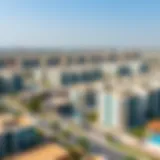Dubai Municipality: Governance and Urban Development Insights
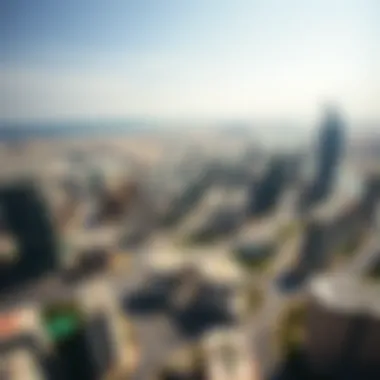

Intro
The Municipality of Dubai stands as a significant player in shaping not only the urban fabric of the city but also in fostering a governance framework that prioritizes public service delivery and sustainable development. With rapid advancements in technology and an evolving population, this municipality adapts its strategies to meet the growing demands of its diverse residents and the interests of international investors. From regulatory frameworks to urban planning initiatives, the Municipality is at the forefront of nurturing an environment that is both livable and economically viable.
Situated strategically in the heart of the Middle East, Dubai's growth story is one of resilience and adaptability. The municipality has continuously innovated its governance structures, integrating modern technology and community feedback into its processes. As we delve into the intricacies of Dubai's municipal governance, public services, and urban development, readers will glean insights that reveal how these elements contribute to maintaining the city's competitive edge on a global scale.
Prelims to the Municipality of Dubai
The Municipality of Dubai serves as the backbone of urban governance in one of the fastest-growing cities in the world. Understanding its role is crucial not only for residents but also for investors, agents, and analysts keen on tapping into the opportunities presented by Dubai's dynamic environment. The municipality's responsibilities extend across various domains, including public service management, urban planning, and ensuring compliance with environmental regulations.
From a historical standpoint, the municipality has evolved significantly since the inception of Dubai, adapting to the city's rapid expansion and shifting demands. The current governance structure stands as a testament to these changes, embodying a blend of traditional values and modern administrative practices.
"Effective governance in urban settings is like steering a ship through turbulent waters. The leader must account for changing tides while keeping the crew and cargo safe."
The municipality's work is intimately tied to improving the quality of life for its residents. Initiatives launched by the Municipality of Dubai often seek to balance economic growth with social welfare. Such balance is essential in attracting investors who desire a stable and conducive environment for business operations. Moreover, as global interest in sustainability rises, the municipality’s role in environmental stewardship becomes all the more pertinent.
In this article, we will explore the intricate layers of the Municipality of Dubai’s governance, services, and urban development. By delving into the history and structural setup of the municipality, we can appreciate the framework that supports this vibrant city's daily functions. This examination not only reveals the inner workings of Dubai’s governance but also underscores its immediate impacts on those living and working in the city.
The subsequent sections will unfolding as a cohesive narrative that not only educates but also enhances the understanding of Dubai as both a global business hub and a livable city.
Core Functions of the Municipality
The core functions of the Municipality of Dubai lay the foundation for the city's governance, focusing on essential areas like urban planning, public health, and environmental regulations. These functions are crucial, as they not only ensure that the city runs smoothly but also significantly impact the quality of life for residents and influence investor confidence.
Urban Planning and Development
Urban planning in Dubai is more than just laying out streets and buildings; it's about creating a thriving community that meets the needs of its people while anticipating future growth. The Municipality plays a significant role here, managing land use and zoning regulations to create spaces that foster business opportunities and residential satisfaction. One can see this in the diversity of neighborhoods, where luxurious skyscrapers sit alongside traditional markets, each crafted to cater for different lifestyles and economic activities.
The benefits of effective urban planning include:
- Enhanced Infrastructure: As the municipality designs the urban layout, it also invests in infrastructure that supports cutting-edge technology and connectivity.
- Cultural Integration: By blending diverse architectural styles, the planning process respects local traditions while accommodating international influences, generating a unique cultural fusion.
- Sustainability: Smart planning includes green spaces and parks, while promoting walkability and public transport, which contributes to overall environmental goals.
Public Health and Safety
The health and safety of the public are top priorities for the Municipality of Dubai. Their efforts encompass a wide range of services, from sanitation and waste management to food safety inspections. The municipality sets high health standards, ensuring that both residents and visitors can enjoy a safe environment.
"Maintaining public health isn't just a task, it's a commitment to the community's well-being."
The public health initiatives include:
- Regular Inspections: Food establishments undergo routine checks to adhere to health and safety regulations, ensuring what residents eat is safe.
- Awareness Campaigns: The municipality runs several community programs to educate citizens on health practices, encouraging healthier lifestyles.
- Emergency Response Services: They also maintain robust mechanisms for emergency response, ensuring quick and efficient action in times of crisis.
Environmental Regulations
Environmental sustainability is echoed in many of Dubai's municipal policies. The challenges of rapid urbanization push the Municipality to implement stringent environmental regulations aimed at balancing development with ecological considerations. This proactive approach is essential in a city that continuously evolves and expands.
Among the environmental regulations upheld by the municipality are:
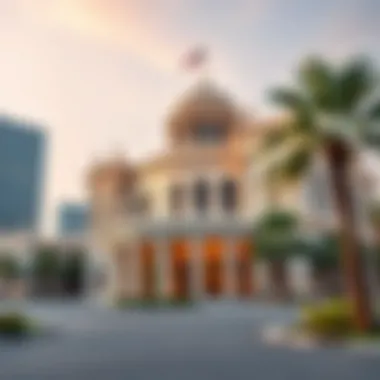
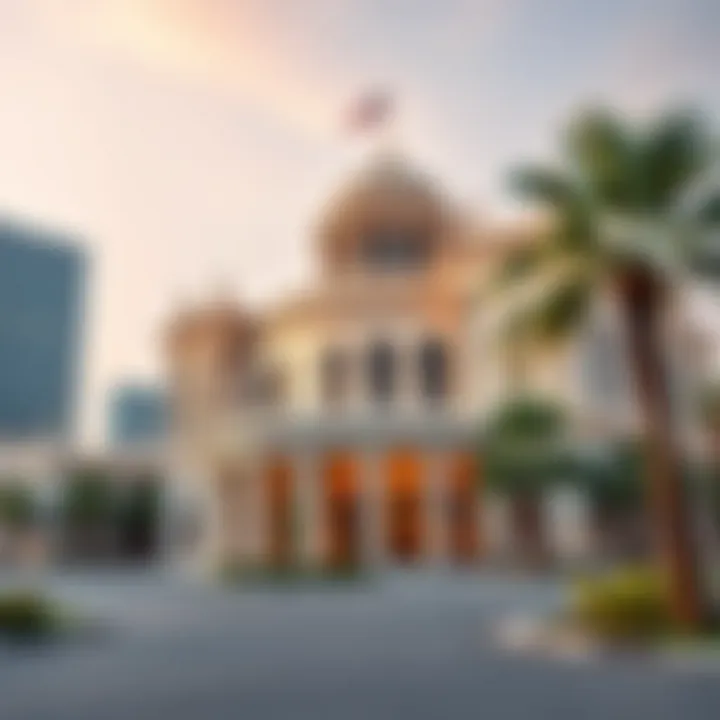
- Waste Management Initiatives: Programs are in place for recycling and responsible waste disposal, which help to minimize the environmental footprint of the city.
- Green Building Codes: New constructions must comply with sustainable building practices, ensuring energy and water efficiency while reducing carbon emissions.
- Air Quality Monitoring: The municipality actively monitors pollution levels, setting standards that businesses must meet, thus safeguarding residents' health.
In summary, the core functions of the Municipality of Dubai are integral to building and maintaining a prosperous city. By focusing on urban planning, public health, and environmental sustainability, the Municipality not only addresses present needs but also prepares the groundwork for a resilient future.
Citizen Services and Engagement
Citizen services and engagement stand at the core of municipal operations, manifesting the influential relationship between government and the public it serves. In the case of Dubai, an efficient and responsive service framework enhances the quality of life for its residents while attracting potential investors. Effectively engaging citizens not only bolsters community trust but also ensures that the municipality meets the residents' needs in a timely and relevant manner. Understanding how these services operate and what initiatives the municipality endorses can give both residents and stakeholders a clearer picture of the city's governance ethos.
Online Services Portal
The Online Services Portal serves as a gateway for residents and businesses to access various municipal services conveniently. This digital platform streamlines interactions with the government, allowing citizens to apply for permits, pay fines, and request information without the need for time-consuming in-person visits. For instance, if a resident wants to apply for a business license, they can complete the necessary steps and track their application status online.
Furthermore, the portal plays a significant role in fostering transparency. Information regarding municipal services and fees is readily available, which can help residents make informed decisions. It’s worth noting that this service also caters to individuals with different needs—offering accessibility features for those with disabilities, ensuring that no one is left behind. Residents are increasingly embracing digital solutions, which in turn reduces the administrative burden on the municipality itself.
In 2022, it was reported that over 80% of municipal transactions in Dubai were processed through this online portal, a clear indication of its effectiveness and popularity.
Community Involvement Programs
Engagement between the municipality and community members doesn't end with digital platforms; rather, it extends into face-to-face interactions through various community involvement programs. These programs are crucial in creating a sense of belonging and boosting civic pride among residents. The municipality conducts regular town hall meetings, workshops, and outreach initiatives that encourage citizens to voice their opinions and contribute to decision-making processes.
Through initiatives like the ‘My Community’ program, residents are invited to participate actively in urban planning discussions, where their feedback can shape future projects. This not only ensures that the services provided align with community needs, but it also empowers residents, fostering a culture of collaboration and shared responsibility for the city's development.
Moreover, the municipality has adopted multi-lingual engagement strategies, enhancing inclusivity among diverse resident populations. Efforts are made to reach out to segments often overlooked, including youth, senior citizens, and expatriates, ensuring that the voice of every community member is valued.
"Engaging with the community is not just a nicety; it's a necessity for building a resilient urban fabric in our city."
By promoting an atmosphere of inclusivity and open dialogue, the Municipality of Dubai not only strengthens its governance framework but also lays a robust foundation for a shared vision of urban development.
Infrastructure Development Initiatives
Infrastructure development initiatives in Dubai are the backbone of its urban landscape. With rapid growth and a competitive economy, the need for cutting-edge infrastructure cannot be overstated. These initiatives provide the framework necessary for public services, enhance connectivity, and support sustainable growth in the city. Without a doubt, strategic investments in infrastructure shape not only the physical environment but also facilitate long-term economic prosperity.
Smart City Projects
One of the more notable initiatives undertaken by the Municipality of Dubai is the Smart City project. These projects aim to leverage technology in improving the quality of urban services and citizen engagement. Think of these initiatives as the pulse of urban life, integrating elements such as traffic management, waste recycling, and energy efficiency.
For instance, the use of Internet of Things (IoT) technologies enables real-time monitoring and management of city resources. Data collected can optimize traffic flows, which helps reduce congestion—a major plus for daily commuters. The Sheikh Mohammed Bin Rashid Smart Learning Initiative also illustrates the commitment to infusing technology into education. By developing smart infrastructure, Dubai is not just building buildings, but is creating environments conducive to innovation and sustainability.
Transportation and Connectivity
Transportation infrastructure has undergone a transformation in Dubai, focusing on efficient connectivity as a priority. The city’s extensive road networks, coupled with a state-of-the-art metro system, facilitate seamless movement across the urban landscape. The Roads and Transport Authority (RTA) has been key in enhancing public transport options, making commuting easier for residents and visitors alike.
The Metro system, for instance, connects vital areas including the airport, business hubs, and residential districts, all while being eco-friendly. Furthermore, the expansion of the Dubai Tramway integrates additional options for public transit, complementing the metro lines. This not only improves mobility but also enhances the economic attractiveness of surrounding properties. With effective transportation links, businesses experience increased foot traffic while residents enjoy a hassle-free commute—an all-around win.
Sustainable Building Practices
Sustainable building practices are critical to reducing the ecological footprint of urban development. The Municipality of Dubai has laid out stringent guidelines for environmentally-friendly construction. The Dubai Green Building Regulations are aimed at promoting sustainable architecture and energy efficiency in new developments.
These practices include the use of solar panels, rainwater harvesting systems, and energy-efficient materials. Building projects like the Dubai Sustainable City exemplify how green architecture is being integrated into urban ecosystems. The goal is not just to create structures but to ensure they harmonize with the environment and provide a healthier lifestyle for residents.


The push for sustainability is not merely a response to global trends; it is an investment in the future of Dubai, ensuring that economic growth does not come at the expense of environmental integrity.
Economic Impact of Municipal Policies
The economic impact of municipal policies in Dubai is a multifaceted subject that warrants careful exploration. These policies don’t merely govern urban planning and regulatory measures; they have a direct effect on the city’s economic landscape. Decisions made at the municipal level influence real estate trends, investment opportunities, and the overall business climate in Dubai, making this a critical area of discussion for investors, analysts, and other stakeholders.
The local government formulates policies that dictate a range of economic activities, from land use to taxation frameworks. Understanding these guidelines is vital for prospective investors and businesses looking to navigate the complex market landscape. Conversely, these policies also assure residents that their city is being managed responsibly and sustainably, thus enhancing their quality of life.
Real Estate Development Guidelines
Real estate forms the backbone of Dubai’s economy, with the municipal government playing a key role by setting the parameters within which this sector operates. The Real Estate Development Guidelines established by the Municipality of Dubai ensure that developers adhere to certain standards while fostering innovation and sustainability.
Some essential elements of these guidelines include:
- Zoning Laws: These dictate how land can be used, from residential to commercial or mixed-use developments.
- Building Regulations: Standards concerning safety, aesthetics, and environmental compatibility are enforced, aiding in maintaining Dubai's distinctive skyline.
- Sustainability Initiatives: The guidelines are increasingly incorporating green building practices to address environmental concerns and support Dubai's aspirations to be a sustainable city.
Such policies not only safeguard urban planning integrity but also boost investor confidence. A well-structured real estate environment attracts more players, which can lead to increased competition and a better quality of service for end users.
Support for Local Businesses
The Municipality of Dubai recognizes that the growth of local businesses is integral to the overall economic health of the city. Policies tailored to support local businesses create fertile ground for small and medium enterprises (SMEs) to thrive.
Key aspects of this supportive framework include:
- Incentives for Startups: These may come in the form of reduced licensing fees, tax breaks, or grants aimed at fostering innovation and entrepreneurship.
- Training Programs: The municipality often collaborates with various organizations to provide workshops and skills training, ensuring that local businesses have access to the latest industry knowledge and practices.
- Market Access Initiatives: Schemes that enhance visibility and accessibility for local products and services can significantly improve the bargaining power of local businesses in a competitive marketplace.
Through these initiatives, the city enhances job creation and promotes a more diverse economy. Supporting local businesses is not just good policy; it’s smart economics. Local enterprises engage deeply with the community, creating a vibrant atmosphere that enriches the quality of life for all residents.
"Well-managed municipal policies can create an economic ecosystem that makes a city thrive. In Dubai, this is evident as investment opportunities flourish alongside community welfare."
Challenges Facing the Municipality
The Municipality of Dubai faces a myriad of challenges that significantly impact its governance and urban development initiatives. Understanding these challenges is crucial, not just for municipal authorities, but also for citizens and investors. As the city evolves at a breakneck pace, the growing population and urban sprawl put enormous pressure on existing services and infrastructure. In this section, we will explore urbanization pressures followed by environmental sustainability concerns that shape the current and future landscape of Dubai.
Urbanization Pressures
As Dubai continues to attract people from all corners of the globe, urbanization remains one of the most pressing challenges that the municipality encounters. The influx of residents, combined with the rapid expansion of businesses, creates substantial demand for housing, transportation, and public services.
This swift growth leads to several specific elements:
- Housing Shortage: With a substantial increase in population, adequate housing becoming scarce. This causes prices to skyrocket, making it difficult for average citizens to find affordable accommodation. The affordability crisis can lead to social tensions and dissatisfaction among residents.
- Traffic Congestion: Another element tied to rapid urbanization is the significant increase in vehicles on the road. Even with extensive transportation infrastructure, traffic jams have become a common sight, frustrating commuters and impacting productivity. More public transport options may help reduce this stress on the roads.
- Strain on Public Services: Schools, hospitals, and recreational facilities struggle to cope with the growing demand. Overcrowded classrooms and long wait times at clinics can degrade the quality of life for Dubai’s residents, making effective planning and resource allocation essential.
In light of these challenges, innovative solutions and proactive strategies are vital. The municipality is deploying smart technologies to track urban growth patterns, aiming to establish policies that promote sustainable development while maintaining an attractive living environment for residents.
Environmental Sustainability Concerns
With rapid development comes the responsibility to address environmental sustainability. The Municipality of Dubai faces significant hurdles in preserving natural resources while promoting urban growth. The delicate balance between development and environmental conservation is an ongoing negotiation.
Here are key considerations regarding environmental sustainability in Dubai:
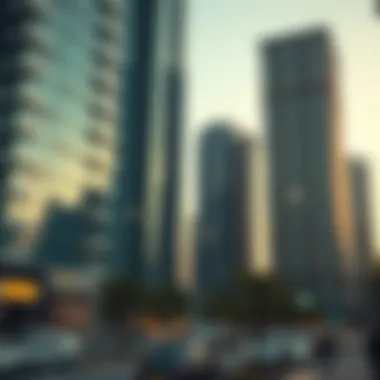
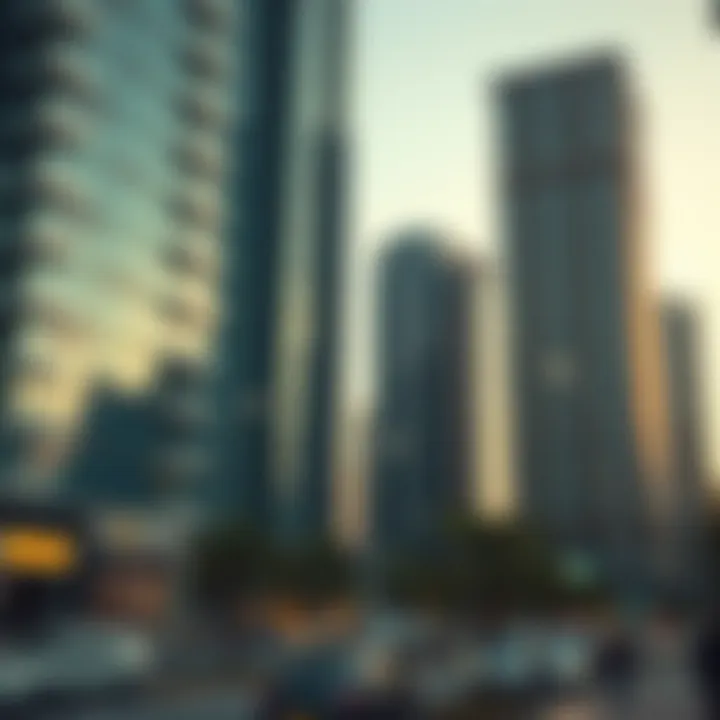
- Water Scarcity: The arid climate of Dubai presents an ongoing challenge. The water supply is largely dependent on desalination, which, although efficient, is energy-intensive and costly. Issues arise around conservation practices and encouraging a culture of sustainability among residents.
- Waste Management: As the city expands, waste generation increases accordingly. The municipality grapples with categorizing waste effectively, promoting recycling programs, and developing robust waste disposal strategies to minimize landfill usage. Finding sustainable alternatives and improving waste management technologies is imperative.
- Air Quality: Elevated levels of air pollution from construction and vehicle emissions can have detrimental effects on residents’ health and well-being. Implementing regulations to minimize emissions and transitioning towards cleaner energy sources is imperative in addressing air quality concerns.
In summary, to ensure a thriving urban environment, the municipality must navigate the challenges that stem from urbanization and environmental sustainability. By devising and implementing forward-thinking strategies, it can enhance both the quality of life for residents and invest in the city’s future viability.
"Urbanization creates opportunities for growth, but it also demands accountability towards the environment."
Future Directions for the Municipality
As the city of Dubai evolves, the Municipality is tasked with not just maintaining its existing systems but also preparing for future challenges and opportunities. The strategies adopted in this phase will be essential for ensuring sustainable development, improved citizen engagement, and technological integration. These forward-thinking initiatives will also enhance the city's appeal to investors and residents alike, making the Municipality of Dubai a critical player in shaping the urban landscape even further.
Embracing Technological Advances
One of the most significant focuses for the Municipality is integrating technology into various aspects of governance and urban planning. The idea isn't just about adopting the latest gadgets but cultivating an environment where data-driven decisions lead to better outcomes for residents.
Smart Solutions are Key: The adoption of smart technologies can improve public services; examples include smart waste management systems that optimize collection routes, cutting down on operational costs and reducing the city's carbon footprint. Searching for efficiency through technology aligns with global trends and showcases Dubai as a frontrunner in urban innovation.
Public Data for Better Transparency: Making municipal data openly available can build trust in governance. It offers a window into decision-making processes and fosters a culture of accountability. The public can access a myriad of datasets, from traffic patterns to air quality indices, encouraging them to engage constructively with their environment.
- Interfaces for Citizen Engagement: Digital platforms can be enhanced to allow residents to not only access information but also to provide feedback on municipal services. When citizens feel heard, they are more likely to contribute positively to their community, which is a win-win situation.*
Expanding Public Participation
Incorporating the voices of citizens in municipal decisions fosters a sense of ownership and responsibility. Expanding public participation isn’t merely about collecting opinions; it’s about creating a dialogue between the Municipality and the community.
- Inclusive Forums: One way to promote this is through community forums that invite feedback on urban development projects. These discussions can highlight concerns that the municipality may not have considered otherwise, making for more comprehensive and accepted planning processes.*
- Collaboration with Local Organizations: Partnering with community groups can yield amazing insights and bring younger demographics into the conversation. Engaging youth initiatives lets them shape their living spaces through their perspectives and innovative ideas.
- Surveys and Platforms for Feedback: Regularly conducted surveys online or in public spaces can keep the pulse on public opinion, enabling quicker adaptations to emerging issues and harnessing the community’s insights to tailor services effectively.*
Good governance in a bustling metropolis like Dubai cannot happen in a vacuum. By embracing technology and enhancing public engagement, the Municipality stands to not only strengthen its service delivery mechanisms but also build a vibrant community that feels valued and connected.
"The future of urban management lies in the collaboration between tech and community engagement, ensuring that cities adapt smartly to challenges while genuinely serving their residents."
With these paths charted, the Municipality of Dubai is poised to remain a beacon of urban governance, balancing innovation with the community's needs.
Culmination
The Municipality of Dubai stands as a significant pillar in the city’s governance and urban framework, orchestrating various facets designed to boost the quality of life for residents and to invite investors. Understanding this concludes our article efficiently by drawing attention to a range of key elements that highlight the municipality's roles and responsibilities. Ultimately, the insights gleaned from this exploration underscore the interconnectedness of governance, service provision, and urban development within this vibrant metropolis.
Summary of Key Findings
In summation, several major findings emerge. Firstly, the governance structure of the Municipality of Dubai is not just top-down; it fosters an environment where public participation is increasingly significant. This participatory approach, especially regarding community programs, triggers a sense of belonging among residents and integrates their voices in the urban discourse.
Moreover, the core functions of the municipality, ranging from urban planning to public health, showcase a multifaceted strategy that's geared towards enhancing livability. The Moniicipality's commitment to environmental regulations has noticeably shifted its urban narrative towards a sustainable future. To put it straightforwardly, the integration of smart city initiatives along with sustainable practices enriches not only the infrastructure but also sets a standard for other cities in the region.
Furthermore, the economic impact stemming from strategic municipal policies cannot be disregarded. Real estate, local businesses, and an array of economic activities flourish under the frameworks set forth by the Municipality. The engagements and guidelines promote a thriving environment aiding both residents in their daily lives and investors looking for lucrative opportunities.
Implications for Residents and Investors
The implications stemming from the Municipality's actions resonate profoundly with both residents and investors alike. For residents, the continuous feedback loops embedded in community involvement programs ensure that their concerns can directly influence future policies. It is noteworthy that initiatives aimed at expanding public participation are crucial for building trust and enhancing civic engagement.
Investors, on the other hand, find value in the stable governance provided by the Municipality. With clear regulations and support for local business ventures, they can operate in an environment that prioritizes economic growth. The clarity in real estate guidelines, combined with ongoing infrastructure development, presents a fertile ground for investment opportunities. This ecosystem of growth, stability, and sustainability also positions Dubai favorably on the global stage.
Reflecting on these factors, one can see how both parties stand to benefit from the Municipality's vast ecosystem. The dual focus on community engagement and investor support paints a picture of a city that is not just growing but thriving within a framework that looks ahead toward a sustainable future.
"The Municipality of Dubai catalyzes a thriving urban ecosystem, fostering an environment where public and private sectors innovate and work in synergy."
For further details, you might explore more on the Municipality of Dubai where additional resources and insights can be found.






